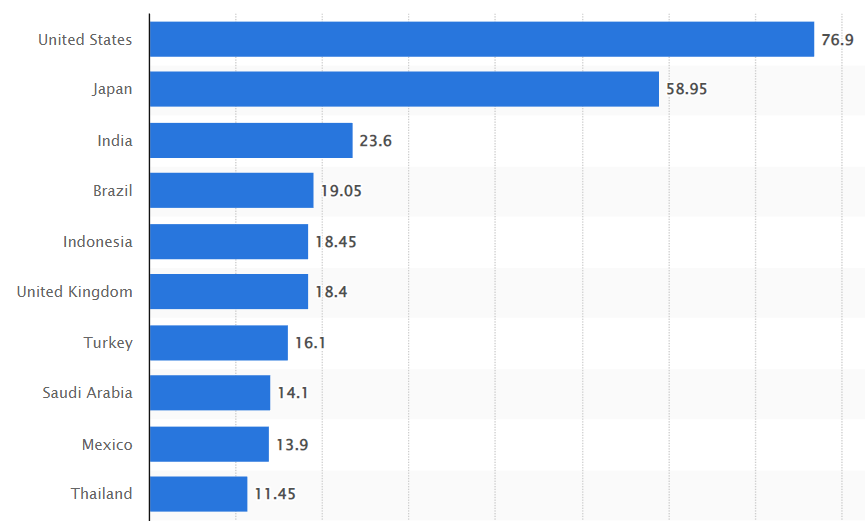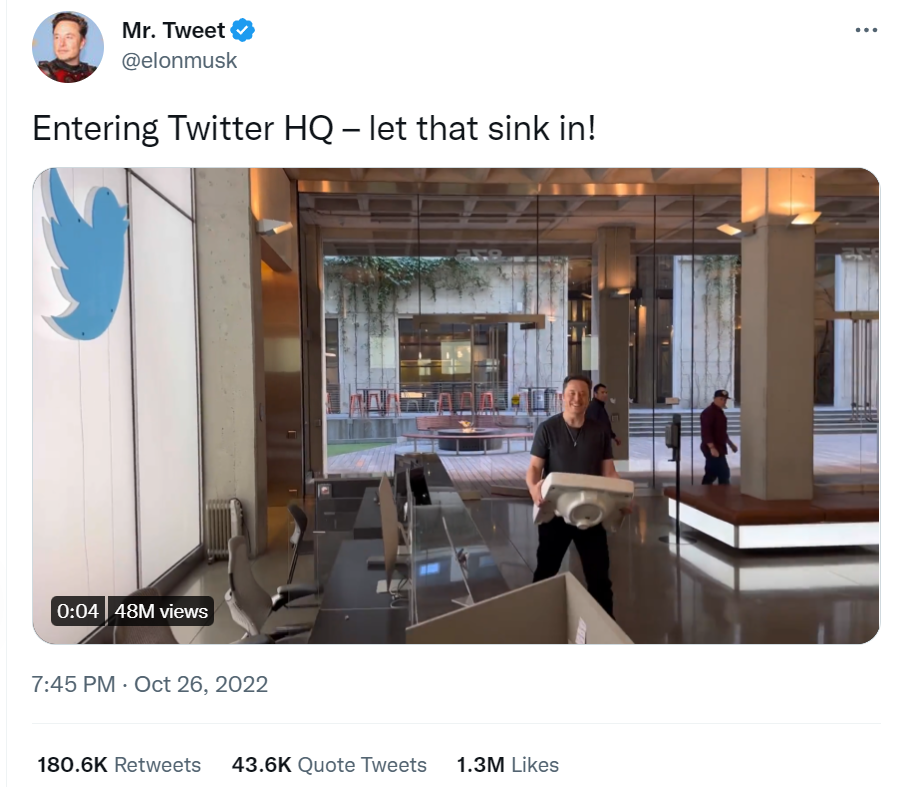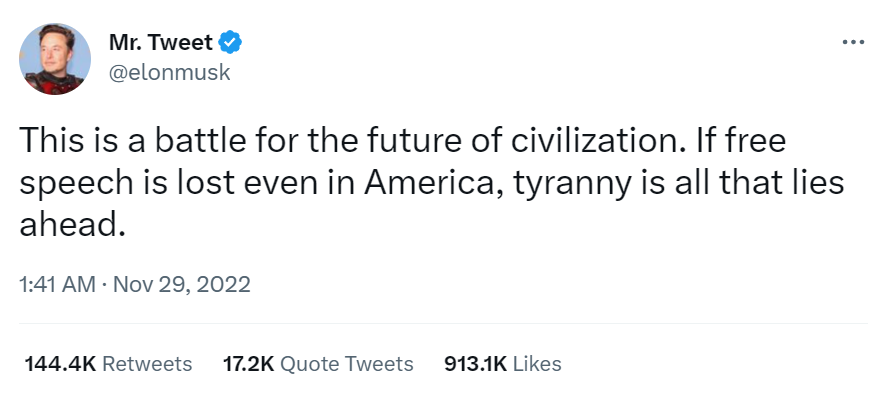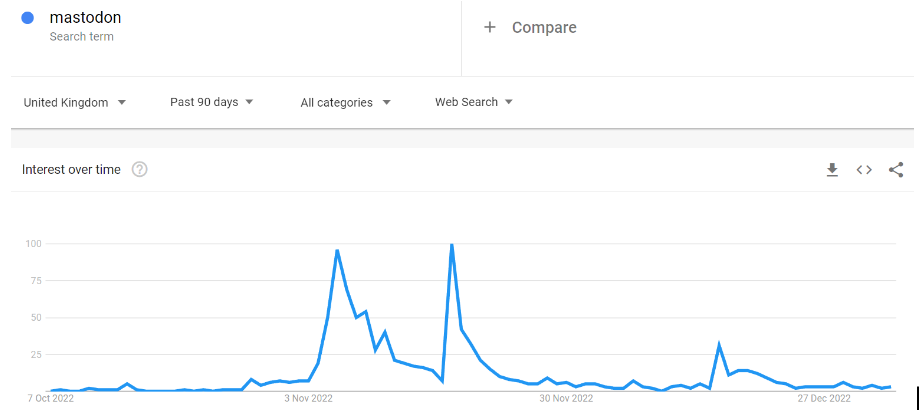Twitter in 2022. It was quite the ride wasn’t it? For the first part of the year, it was business as usual with the standard crop of amusing topical memes, angry strangers shouting at each other and the occasional fascinating insight into a cornucopia of topics from the sublime to the ridiculous, and the shocking to the thought-provoking. Indeed, Twitter remained the ceaseless carousel of curiosities it always was.
And users were seemingly happy to stick around. As of December 2022, Twitter's audience totalled over 368 million monthly active users worldwide, with over 18 million of those in the UK.

Compare this to Facebook with its billions of users or Tiktok which is already bigger than Twitter (and still growing fast), it is still a relatively small player. And if some reports are to be believed, this figure is expected to decrease to around 335 million by 2024, a decline of approximately 5% compared to last year. So why does the future look less than rosy for a social media platform now in its 17th year?
Step forward Elon Musk.
Musk’s relationship with Twitter to date has played out like some kind of digital age Richard Burton v Elizabeth Taylor scenario with lawsuits, acrimony and an on-off-then-on-again vibe that made some US lawyers very rich, but left the rest of us pondering where it was all heading.
Why did Elon Musk buy Twitter?
There are a few theories floating about regarding Musk’s initial desire to buy Twitter. According to Musk himself, the acquisition was all part of his crusade to promote and encourage free speech, declaring last year that:
“Free speech is the bedrock of a functioning democracy, and Twitter is the digital town square where matters vital to the future of humanity are debated”.
Another theory is that Twitter could potentially allow him to use the data and algorithms from the platform to develop his other companies, including Tesla and SpaceX, using Twitter’s extensive repository of human language to feed into AI projects (e.g. the new 'Optimus’ Tesla bot).
But the answer could simply be that he was already a fan of the platform. Even before his involvement, it was evident he liked to tweet - a lot. Similar to a certain other well-known petulant billionaire manchild, Twitter was Musk’s tool of choice for churning out controversial brain farts, mini tantrums and litigious swipes at whoever he happened to take a dislike to that day (his since-deleted tweet about Thai cave rescuer Vernon Unsworth being one prime example).
Twitter Vs Musk
After agreeing to buy Twitter for $44 billion last spring, Musk spectacularly started back-peddling on the offer, announcing the deal was ‘temporarily on hold’, citing the need to acquire additional information regarding the volume of fake and spam accounts on the platform. As the world grabbed its popcorn, the Musk v Twitter spat played out in glorious technicolour, with Twitter eventually filing a lawsuit against Musk.
"Musk's conduct simply confirms that he wants to escape the binding contract he freely signed, and to damage Twitter in the process"
Musk subsequently countersued and the whole situation spiralled into waters murkier than an alt-right subreddit forum. By the end of October, Musk blinked first and the acquisition was made official - Twitter was now in the hands of the richest man in the world (as he still was at that point). Keen to demonstrate his versatility as a visual comedy genius as well as a Machiavellian money-making overlord, Musk dropped his ‘Entering Twitter HQ - let that sink in!’ tweet.

Oh Elon, you are *quite* the card.
While Elon and his pet sink walked in, a lot of staff were kicked out following Musk’s mass sacking of many senior executives including CEO Parag Agrawal, CFO Ned Segal and Head of Legal Policy, Trust and Safety Vijaya Gadde. He then promptly laid off 50% of the company's 7,500-strong workforce, among them the communications team, the curation unit that assisted in combating disinformation and the human rights team…basically everyone except the kitchen sink (who I believe is now part of Musk’s PR team following his lolsome ‘entering HQ’ tweet).
How did Twitter users react?
Opinion was divided. While some right-leaning commentators and tweeters generally hailed the bad boy of tech’s arrival as cause for celebration, others were wary of what this meant for the platform. Musk was all too happy to fan the flames, tweeting shortly after the takeover an unfounded and inflammatory conspiracy theory regarding the attack on Paul Pelosi, husband of former Speaker of the US House of Representatives Nancy Pelosi. He deleted it, but his words served as a dog whistle for far-right figures who may have viewed the tweet as a green light for posting increasingly controversial, offensive content under the guise of ‘free speech’.

This, along with Musk’s proposed $8 charge for verified account status to help ‘reduce bad actors’, proved too much for some users, and a mass exodus to social media platform Mastodon looked imminent, with 70,000 new users signing up to the site the day after Musk’s takeover.
So what does all this mean for the future of Twitter?
Will the platform go on to prosper under Musk or does it spell the beginning of the end? Let’s take a look at a couple of scenarios for the year ahead - one where Twitter evolves and thrives, and another where it takes a catastrophic nosedive.
The dive scenario
1. Elon Musk will run the platform into the ground
There is a common misconception that if someone is very rich, it must mean they’re very smart. The likes of Donald Trump have helped to dispel that myth, but there are many in the tech world who still view Musk as some sort of genius. In the western world where religion is rarely practised, we still need idol figures, and for many ‘tech bros’ Elon fits the bill and more.
And who knows? Maybe his master plan for Twitter is working but us ‘non believing, silly laymen’ just don’t realise it yet. But paying ridiculously over the odds for Twitter (some say perhaps 300% more than its actual worth), scaring off advertisers, firing half the workforce, and forcing the other half to work ‘extremely hardcore’ hours does not strike me as a business venture bound for success. Many agree - even one of Tesla’s main investors recently berated Musk, declaring him ‘not suited to running Twitter’ and should instead focus on repairing the damage his acquisition has done to Tesla’s brand.
2. The platform will face bankruptcy
It is now estimated that half of Twitter’s top 100 advertisers have fled the platform since Musk took over. Advertising accounts for 90% of Twitter’s $5.1bn in annual revenue but with a lower-than-expected $1.1 billion projection in Q4 of last year, the situation is looking bleak. Twitter’s top advertiser Apple were similarly spooked, however this was all apparently down to a ‘misunderstanding’ which both Musk and Apple boss Tim Cook were quick to put to bed. Musk himself warned the company could go bust, stating that without a rise in subscription revenue, the platform might not survive the forthcoming recession.
He frequently (and vocally) laid the blame at the door of ‘activist groups’ who were, in his eyes, pressurising advertisers to leave the platform. Whether there is any truth in this or not, Twitter will somehow need to coax advertisers to return in 2023. If they don’t come back, there is a very real chance of Twitter going under. The company is currently $13 billion in debt and incurs interest expenses of around $1 billion every year. So bringing advertisers back on board is essential in 2023 just to pay the interest, or the only remaining option (at present) is for the site to find 64 million subscribers willing to pay $8 to replace existing revenue and cover losses.

3. Extremism and lack of moderation force users off the platform
According to a report from The Guardian, more than 30 million users are expected to leave Twitter over the next two years and this is being partially put down to the rise of its extremist and offensive content. Findings by one US academic study revealed that Twitter saw an immediate, visible and measurable spike in hate speech after Musk’s takeover, with targets including LGBTQ, BAME and Jewish communities:

Following the mass cull of moderators, and Musk’s determination to allow controversial voices back onto the platform (Trump, Andrew Tate and Marjorie Taylor Greene to name but a few), the volume of extremist and hateful content is likely to rise even further. The more Twitter evolves into a Parler-esque playground, the more likely it is people will leave in their droves. Any remaining advertisers are also likely to flee, uncomfortable at the prospect of sharing screen space with accounts sharing hateful and discriminatory content.
The thrive scenario
1. A new CEO will bring prosperity
In one of his infamous Twitter polls (‘Vox Populi, Vox Dei!’ etc) Musk posed the question as to whether he should step down as head of Twitter. Nearly 20 million people (or were they bots? Hmmm..) voted that he should, and the die was seemingly cast. Whether he had already grown tired of his new role after a few months in the hot seat prior to posting the poll is up for debate, however the potential of a new, calmer, more appropriate captain taking the helm may entice advertisers back and even steer the platform into more profitable waters.

2. Twitter evolves into a super app
Elon Musk has reportedly stated that his acquisition of Twitter was part of a wider plan to create a super app (or ‘everything app’ as he referred to it) in Western markets, integrating various features such as communication, payment, and social media into one platform. This would emulate China's ‘super app’ WeChat, which has approximately 1 billion users and incorporates multiple features, such as those mentioned above.
But there may be a number of obstacles along the way, not least rebuilding consumer trust following a number of data breaches on the site (the most recent occurring just a few weeks ago) which is hardly going to install a sense of confidence in this new endeavour. But if Musk’s vision comes to fruition, this bold venture could go on to elevate the platform into something quite spectacular.
3. Loyalty of current users
Following the initial flurry of interest in Mastodon, the expected mass exodus failed to materialise. Interest appeared to wane, with search volume for the term returning to pre-Musk levels.

What this perhaps suggests is that Twitter users are creatures of habit. The platform serves as an engaging space for those who may shun the ceaseless vanity churn of Instagram, find Facebook too provincial, and consider TikTok the stomping ground for the cool kids at the back of the bus. Perhaps Twitter’s loyal following will prove to be its saviour….if users are seen not to be jumping ship, then this may lure advertisers back to the site.
Final thoughts
This is a difficult call to make at this stage. It certainly feels like Musk is too loose a cannon to guarantee a safe and profitable future for Twitter. One of the key factors that will determine Twitter's success in 2023 is its ability to attract and grow subscribers as well as advertisers. With interest payments coming in at $1 billion a year alone, even with a heavily reduced workforce (the impact of which has yet to be played out) the need to generate cash is real.
Couple this with HUGE pressures at his first born Tesla, which will need a lot more of his time, whatever crazy ideas he might have (and no doubt, we’ve not seen the last of his ‘genius’) might not get the chance to see the light of day. However, if recent history is anything to go by, Musk does seem to really not give many effs about what other people think and follow his own path come hell or highwater.
My view is this will be a dive year. I don’t see how advertisers, or users, will cough up enough to make the money needed or give him enough rope to turn things around. Twitter has always been a small player really and to make it big, big change was needed. Whilst Musk has proved himself to be hugely successful in other areas, I feel his ego has got way too big for him this time and this craziness will only clip the blue bird's wings rather than let it soar to new heights. Whatever happens, it’ll be one crazy flight.




